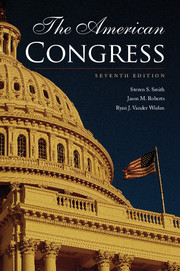Book contents
- Frontmatter
- Contents
- Preface
- Acknowledgments
- 1 The American Congress
- 2 Representation and Lawmaking in Congress
- 3 Congressional Elections and Policy Alignments
- 4 Members, Goals, Resources, and Strategies
- 5 Parties and Leaders
- 6 The Standing Committees
- 7 The Rules of the Legislative Game
- 8 The Floor and Voting
- 9 Congress and the President
- 10 Congress and the Courts
- 11 Congress, Lobbyists, and Interest Groups
- 12 Congress and Budget Politics
- Appendix Introduction to the Spatial Theory of Legislating
- Suggested Readings
- Index
- References
9 - Congress and the President
- Frontmatter
- Contents
- Preface
- Acknowledgments
- 1 The American Congress
- 2 Representation and Lawmaking in Congress
- 3 Congressional Elections and Policy Alignments
- 4 Members, Goals, Resources, and Strategies
- 5 Parties and Leaders
- 6 The Standing Committees
- 7 The Rules of the Legislative Game
- 8 The Floor and Voting
- 9 Congress and the President
- 10 Congress and the Courts
- 11 Congress, Lobbyists, and Interest Groups
- 12 Congress and Budget Politics
- Appendix Introduction to the Spatial Theory of Legislating
- Suggested Readings
- Index
- References
Summary
The president is an integral part of the legislative process. the basic rules of the legislative game specified by the Constitution provide for three institutional players – the House, the Senate, and the president. The president requires Congress to pass legislation for any policy that requires statutory authorization. In turn, the enactment of legislation necessitates presidential approval unless both chambers of Congress can muster a two-thirds majority to override a veto. Moreover, the Senate must ratify treaties negotiated by the president and must approve the president's choices for top executive and judicial posts. Congress must approve all funding for federal programs. Interdependency, based on shared as well as separate powers, characterizes the relationship among the three institutions.
Interdependency would not be important if the House, Senate, and president held similar policy preferences on important issues. Even when one party controls the House, Senate, and presidency, incumbents of the three institutions are not likely to have identical views. Representatives, senators, and presidents are elected on different cycles and they have diverse constituencies. They are likely to anticipate and react to somewhat different political demands and conditions.
- Type
- Chapter
- Information
- The American Congress , pp. 277 - 318Publisher: Cambridge University PressPrint publication year: 2011

